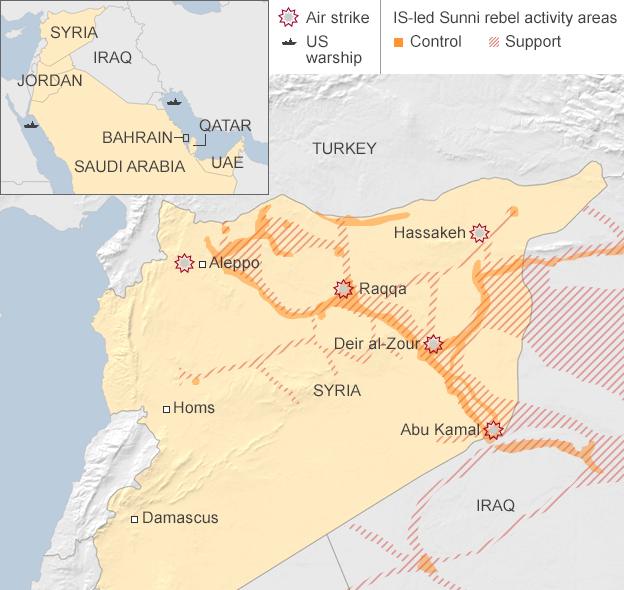IS strikes: Not America's fight alone - Obama
- Published
''I'm grateful... to America and her partners,'' one refugee told the BBC
President Obama has hailed the support of Arab nations in air strikes on Islamic State (IS) militants, saying: "This is not America's fight alone."
He was speaking hours after the US and Arab allies launched their first air strikes against IS in Syria.
Activists say at least 70 IS militants and 50 other al-Qaeda-linked fighters were killed in the strikes.
US state department spokeswoman Jan Psaki said the US had warned Syria in advance "not to engage US aircraft".
But she added that Washington had not requested permission or given advance notice of the timing of the attacks.
The US has released military footage showing the impact of Monday's air strikes
'Wave of attacks'
President Obama confirmed that Saudi Arabia, the United Arab Emirates, Jordan, Bahrain and Qatar had taken part in or supported the strikes.
He said the US was "proud to stand shoulder to shoulder with these nations".
President Obama: ''We're going to do what's necessary to take the fight to this terrorist group''
The Pentagon said warplanes, drones and Tomahawk cruise missiles were used in the strikes.
IS has seized large areas of Syria and Iraq, and the US has launched nearly 200 air strikes in Iraq since August.
But Monday's strikes expanded the anti-IS campaign across the border into Syria for the first time.
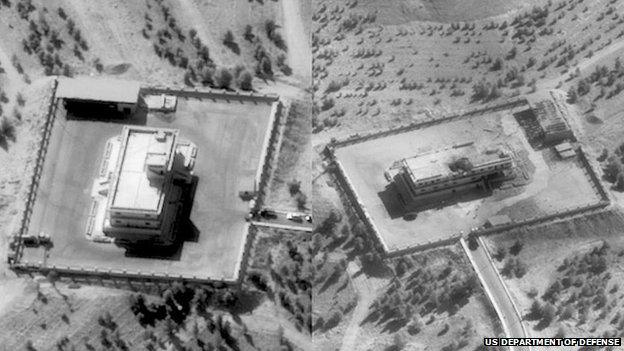
Before and after: The US defence department says this was the first time an F-22 stealth fighter was used in a combat role
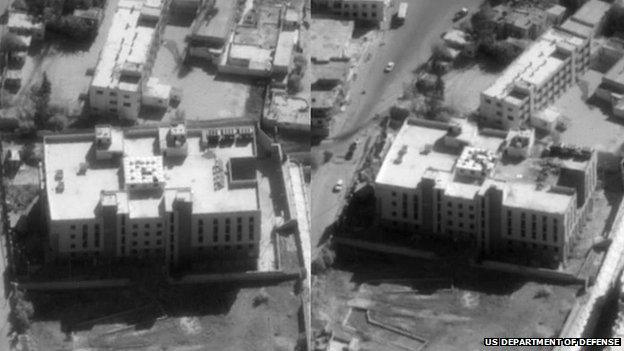
Before and after: A Tomahawk missile struck the Islamic State's financial centre
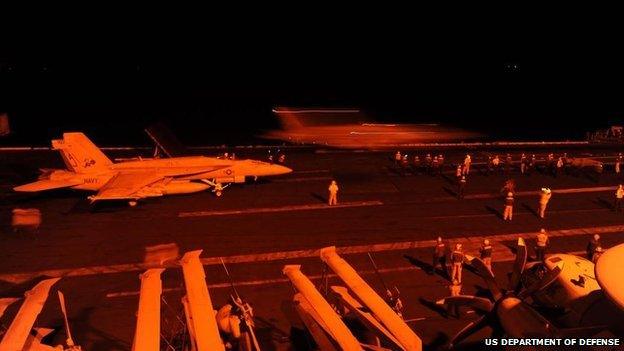
F-18 fighters launched from the USS George HW Bush aircraft carrier in the Gulf
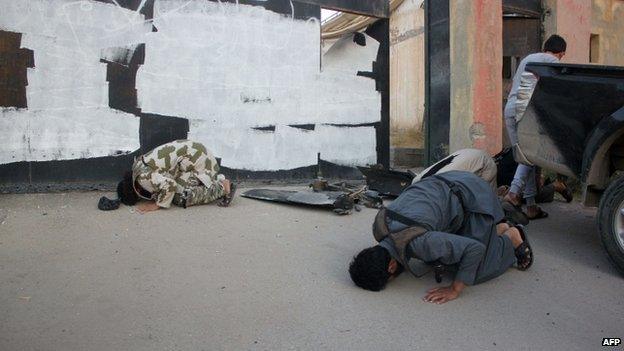
IS militants pray at the spot where they say a US drone crashed into a communications tower in Raqqa
The strikes targeted the group's main headquarters in its stronghold of Raqqa, north-eastern Syria, as well as training compounds, vehicles and storage facilities in several other areas.
They were organised in three separate waves with US fighter jets carrying out the first set, and Arab nations participating in the second and third, Pentagon spokesman Lieutenant General Bill Mayville told reporters.
Tomahawk missiles were just one element of the attack, as Richard Lister reports
Later on Tuesday, US Secretary of State John Kerry said the US would not "allow geography or borders" to prevent action against IS militants.
"We will hold them responsible for their grotesque atrocities," he said at the United Nations in New York, flanked by Iraq's president and foreign minister.
'Imminent attacks'
President Obama said al-Qaeda-linked militants, known as the Khorasan Group, were also targeted with air strikes in Syria.
US officials say the group had been plotting "imminent attacks" against the West, and had established a safe haven west of Aleppo.
As well as informing Syria's government of the impending strikes, the US reportedly told Iranian officials attacks were imminent, Reuters reports.
In other reaction:
UN Secretary General Ban Ki-moon said extremist groups in Syria "pose an immediate threat" but did not explicitly back the air strikes
Hassan Nasrallah, the leader of Lebanese Shia militants Hezbollah, criticised the US action, calling the US "the mother of terrorism and the origin of terrorism"
Iranian President Hassan Rouhani said military action in Syria lacked "legal standing" without a UN mandate or approval from the Syrian government. Shia-majority Iran is a Syrian government ally
Turkish President Recep Tayyip Erdogan told reporters his country could increase military or logistical support. Turkey had been hesitant to join a coalition while 46 of its nationals were held hostage by IS.
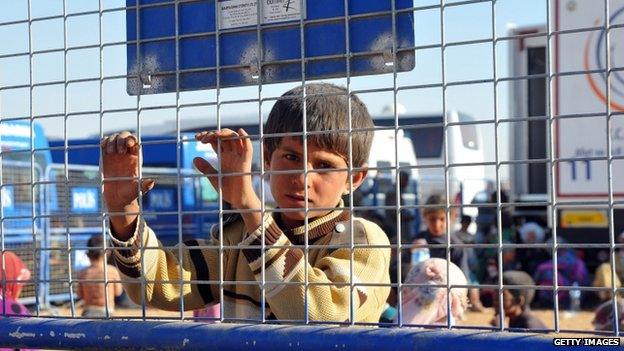
Over 130,000 Syrians poured into neighbouring Turkey this week fleeing IS militants advancing in the north

Analysis - Jonathan Marcus, BBC diplomatic correspondent
The Pentagon set out three broad groups of targets arranged in an arc across northern Syria.
Those closest to the Mediterranean coast seem to have been hit largely by Tomahawk cruise missiles launched from warships - this is an area where Syrian government air defences may still have coverage.
In a briefing Lt Gen William Mayville noted that Syrian air defences were "passive", as he put it, during the course of the operation.
This suggests a conscious decision by Syrian commanders who perhaps feared that active scanning by their defences might draw down air attacks upon them.
The operation was notable for involving aircraft from Jordan and from Washington's Gulf allies. It also marked the first use in combat of one of the USAF's most modern aircraft, the F-22 Raptor.
This, the Pentagon is stressing, is just the start of "a sustained air campaign", the tempo of which, says a Pentagon spokesman, "will be dictated by facts on the ground".

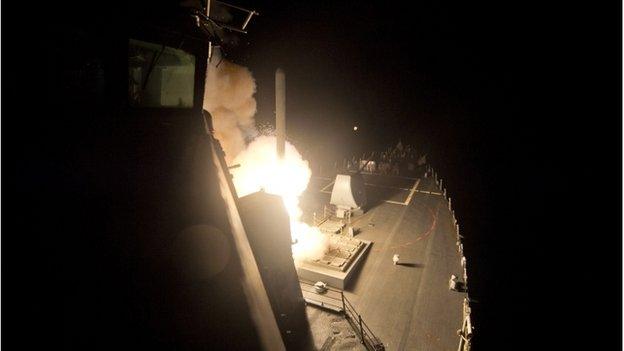
Tomahawk cruise missiles were launched from the USS Arleigh Burke in the Red Sea
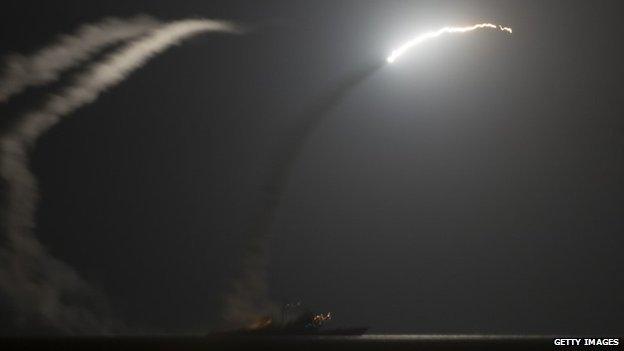
The US military said a total of 14 air strikes were carried out in several areas in the north and east of Syria
Syrian President Bashar al-Assad, quoted by state media, said he supports any international efforts to combat "terrorism" in Syria.
Analysts say it is significant that countries with a Sunni majority, like Jordan and Saudi Arabia, are among those supporting US efforts against IS.
IS members are jihadists who adhere to an extreme interpretation of Sunni Islam and consider themselves the only true believers.

Formed out of al-Qaeda in Iraq (AQI) in 2013, IS first captured Raqqa in eastern Syria
It captured broad swathes of Iraq in June, including Mosul, and declared a "caliphate" in areas it controls in Syria and Iraq
Pursuing an extreme form of Sunni Islam, IS has persecuted non-Muslims such as Yazidis and Christians, as well as Shia Muslims, whom it regards as heretics
Known for its brutal tactics, including beheadings of soldiers, Western journalists and aid workers
The CIA says the group could have as many as 31,000 fighters in Iraq and Syria
The US has been launching air strikes on IS targets in north-eastern Iraq since mid-August

